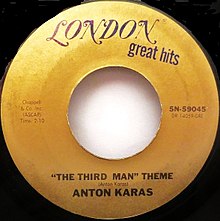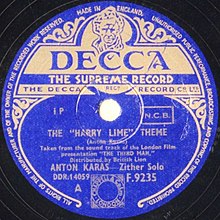Harry Lime theme
The Harry Lime Theme ( Engl. The Third Man Theme ) is the title one of Anton Karas composed and on the zither played instrumental music , which gained worldwide fame in 1950 in the year.
History of origin
Director Carol Reed began preparations for the film The Third Man in Vienna on September 20, 1948 . Filming in Vienna began on October 22, 1948, the last take took place on December 11, 1948. Reed became aware of Anton Karas there in October 1948, who was supposed to play the typical Austrian instrument zither for the film music . The strangely abrupt, metallic sound of the stringed instrument perfectly expressed the wistful, melancholy mood of the film. Karas, initially unwilling, studied a book about zither music, from which he adapted parts for his composition. He was invited to London for this purpose on June 1, 1949 , where he received a weekly salary of £ 30, £ 20 pocket money and reimbursement of expenses. The soundtrack was created in Alexander Korda's London Film Studios, where the homesick Karas worked up to 14 hours a day for 12 weeks on his first composition. The sound recordings for the film music took place until August 1949, on August 25, 1949, co-producer David O. Selznick saw the film for the first time. The events surrounding the first meeting between Reed and Karas are controversial.
The instrumental music performed with the zither by the composer Anton Karas was named after the film's title character Harry Lime (played by Orson Welles ). The film was released in Great Britain on August 31, 1949, and received the Palme d'Or at the Cannes Film Festival on September 17, 1949 . On November 12, 1949, the score was copyrighted, with Korda paying just £ 300 for all rights. The film music carries the film and is another star alongside the film cast. On November 25, 1949, Selznick wrote enthusiastically about what he believed to be a sensational zither piece.
Publication and Success
The single The Third Man Theme / Der Café-Mozart-Walzer (London 300057/45 and London 536/78) came on the US market in December 1949, the film only premiered there on February 2, 1950. The single hit the US charts on February 18, 1950 and topped the list for 11 weeks from April 29, 1950. Until the end of 1949, 500,000 copies were sold worldwide; With 4 million copies sold, it is still one of the best-selling instrumentals. Teldec estimated total worldwide sales in 1963 at over 40 million records .
Gaston Claret (music) and Pierre Bayle (text) sued Karas in March 1950 because they believed that the melody of their published composition Si petite (recorded July 8, 1932) by Lucienne Boyer corresponded. On April 28, 1950, the Paris Arbitration Tribunal referred the case and dismissed the claim as unfounded.
Cover versions
There are at least 54 cover versions . The first came from British orchestras such as The Café Vienna Quartet (November 1949), Lou Preager & Orchestra (December 1949) or Roberto Inglez & His Orchestra (December 1949). In the USA followed Guy Lombardo (December 9, 1949), who replaced Anton Karas in first place with his version from May 6, 1950 and became a number one hit again for eleven weeks . This was followed by Hugo Winterhalter (December 1949; rank 21), Hank Garland and his Sugarfooters (February 1950), Freddy Martin & Orchestra (March 1950; rank 17), Ethel Smith (organ; April 1950), Victor Young (May 1950; rank 22), Hank Snow & Chet Atkins (September 1953), Billy Vaughn (LP The Golden Instrumentals ; September 1956), Earl Bostic (LP Dance Music from the Bostic Workshop ; October 1958), Mickey Baker (guitar, October 1959) or Eddie Cochran (as Fourth Man Theme ; November 1959). Walter Lord wrote a text for the Fontane Sisters (February 1959). The Skatalites brought out a version of Ska (as Third Man Ska ; 1965), followed by Sandy Nelson (November 1965), The Beatles (1969), The Band (October 1973), The Shadows (September 1981) or André Rieu (LP Strauss & Co .; May 1995). In 2001 the theme was used in the movie The Shoe of Manitu . 54 cover versions can be listened to in the Third Mann Museum in Vienna.
Individual evidence
- ^ Anthony Slide, Fifty Classic British Films 1932-1982 , 2013, pp. 76 ff.
- ^ Charles Drazin, In Search of the Third Man , 1999, p. 55.
- ^ A b Association for the History of the City of Vienna, Volume 61, Issues 1–4, 2006, pp. 12f.
- ↑ Franz Zwetschi Marischka, Always smile , 2001, pp. 110–111.
- ↑ Cannes Festival, All Awards 1949. ( Memento of the original from December 26, 2013 in the Internet Archive ) Info: The archive link was inserted automatically and has not yet been checked. Please check the original and archive link according to the instructions and then remove this notice.
- ↑ Derek Threadgull, Shepperton Studios , 1994, p 76th
- ^ Anthony Slide, Fifty Classic British Films 1932-1982 , 2013, p. 76.
- ↑ both pieces appear in the film
- ^ Joseph Murrells, Million Selling Records , 1985, p. 64.
- ^ Don Tyler, Hit-Songs 1900-1955 , 2007, p. 314.
- ^ 'Third Man' Pulls 40 Million Disks , Billboard Magazine, June 29, 1963, p. 52.
- ↑ Anton Karras , DER SPIEGEL 13/1950 of March 30, 1950, p. 32.
- ↑ Radiocolg - strings that sound like today. An instrument portrait of the zither (3) , Radio Ö1, orf.at, broadcast on April 6, 2016, 9:45 am, accessed April 7, 2016. - 7 days to listen to.

